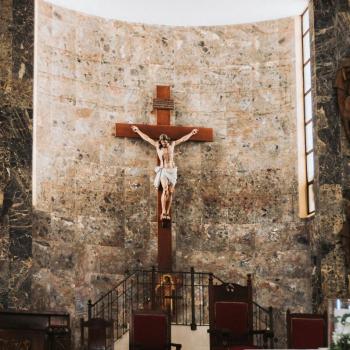When I lived in Philadelphia, a friend of mine–an artist and musician—spent hours collecting broken glass from city streets. Why? She was determined to transform these unused, sharp and uneven broken bits into beautiful mosaics. Even with occasional scrapes and scratches from the shards she had collected, she was eager to add the remnants of car windows, storefronts, and robberies to her latest mosaic. In fact, here is an article published about her studio in CatholicPhiilly.com.
God’s mercy
This artwork was visually beautiful—but the concepts underlying it were perhaps even more beautiful. The artwork was a tangible demonstration of God’s mercy, which, has Pope Francis shared just weeks before he passed away, is for everyone. Just as my friend created something beautiful from the city’s brokenness, so too, does God create something beautiful from our brokenness.
Offering
Can you think of a time that you got stuck on a sin, mistake, or failure? Or maybe you recognize your weaknesses and find them uncomfortable to dwell upon. In the Catholic tradition, we can give these all to Jesus. Just as Jesus offered Himself to God when He died on the cross, so too can we offer ourselves to God—and that means all of us. When we do, it’s as if we’re giving him our broken colored glass so that He, an Artist, can use all for a beautiful work of art, blessing us and the whole world.
All of You
Whenever I think of this concept, I remember my kids singing Disney’s Encanto’s, “All of you.” (If you’re curious about finding God’s voice in song, read this previous blog post). This is exactly what God wants. “All of you, all of you.”
Through God’s mercy, all of you—including all brokenness, sins, mistakes, failures, and shortcomings—will be transformed into something beautiful and life-giving, for you and others.
So He might have mercy
In fact, speaking of my children–they tend to make a lot of mistakes, just like we all do. But sometimes they feel bad when they make mistakes, so I remind them about God’s mercy: “God delivered all to disobedience, that he might have mercy upon all” (Romans 11:32). This sounds to me like God actually allows us to sin and make mistakes because He longs to pour out His mercy upon us. It sounds like Mercy is part of God’s plan; and it sounds like God needs our broken shards for his mosaic masterpiece.
Beauty from brokenness
This concept of offering all to God, including our brokenness, can be done by praying a morning offering prayer. When we offer ourselves to God in the morning, we give Him all our mistakes, sins, and failures, entrusting our entire day to Him. We hope and believe that through His Mercy, He will use everything for glory—or beauty. God, an artist, creates beautiful things from brokenness.

Photo by Maria Oswalt on Unsplash
Psychology and Mercy
Post-traumatic growth
Interestingly, this concept of transformation through brokenness is not only reflected in spiritual teachings but also in psychological research. One such concept, post-traumatic growth, explores how suffering can be a catalyst for personal growth and healing. In fact, people who’ve endured past trauma might experience a variety of positive life changes, including new inner strength, more fulfilling relationships, deeper appreciation of life, more openness to other people, and an important shift in priorities (see Dell’Osso et al., 2022, for a review on this topic).
Such growth is often mediated, or explained, by forgiveness—a concept related to mercy. Forgiving oneself (Sperandio et al., 2023) and forgiving offenders (Chang & Lin, 2012) might yield more post-traumatic growth.
Forgiveness
Forgiveness, even more broadly, tends to be beneficial. It leads to improved mental health and well-being (Toussaint et al., 2016), more positive emotions (Toussaint et al., 2016), less stress and better physical health (Sifferlin, 2016), and improved social connection with others (Cherry, 2024).
Similar benefits are found for forgiveness and compassion towards oneself (Akhtar & Barlow, 2022; Mroz, 2022).
Give Him all brokenness, “all of you”
So, the next time you find yourself burdened by mistakes and regrets, remember that God can transform your brokenness into something beautiful. You might want to take a moment and offer “all of you,” including all of your brokenness, to God, trusting that through His mercy, He will transform everything into a beautiful masterpiece—bringing life and beauty to you and to the world.
References
Akhtar, S., & Barlow, J. (2022). Forgiveness, self-compassion, and flourishing: A mediation model. Frontiers in Psychology, 13, 981941. https://doi.org/10.3389/fpsyg.2022.981941
Chang, E. C., & Lin, J. H. (2012). Forgiveness and posttraumatic growth: The moderating role of dispositional optimism. Journal of Social and Clinical Psychology, 31(6), 650-669. https://doi.org/10.1521/jscp.2012.31.6.650
Cherry, K. (2024). How forgiveness impacts mental health and relieves stress. Verywell Mind. https://www.verywellmind.com/how-forgiveness-impacts-mental-health-and-relieves-stress-7497219
Dell’Osso, L., D’Andrea, G., & Carducci, L. (2022). Post-traumatic growth: A review of its psychometric properties. Journal of Traumatic Stress, 35(3), 412–421. https://doi.org/10.1002/jts.22757
Sifferlin, A. (2016, May 4). Why forgiving someone is good for your health. Time Magazine. https://time.com/4370463/forgiveness-stress-health/
Sperandio, J., Davidson, K., & O’Leary, M. (2023). The relationship between posttraumatic growth and forgiveness following the death of a loved one. Journal of Humanistic Counseling, 60(2), 174–190. https://doi.org/10.1002/johc.12202
Toussaint, L., Owen, A. D., & Cheadle, A. (2016). Forgive to live: Forgiveness, health, and longevity. Research on Aging and Longevity. https://pubmed.ncbi.nlm.nih.gov/27009829/















